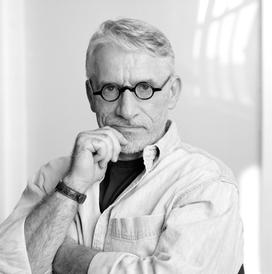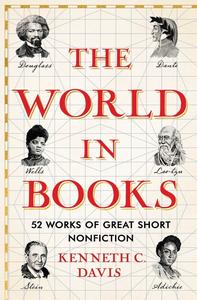
|
|
| photo: Nina Subin | |
Kenneth C. Davis is the author of America's Hidden History and Don't Know Much About History, which gave rise to his Don't Know Much About series. In addition to his books, Davis's writing has appeared in the New York Times, the Washington Post, and Smithsonian magazine, among other publications. He has appeared on CBS Mornings, Today, and NPR, and was featured in a CNN Special Report on the 1918 influenza outbreak. The World in Books: 52 Works of Great Short Nonfiction (Scribner, October 8, 2024), brings together his twin passions for books and history. Davis lives in New York City with his wife, Joann Davis.
Handsell readers your book in 25 words or less:
The World in Books is an intellectual starter kit for the curious, an accessible introduction to 52 of history's greatest short nonfiction books.
On your nightstand now:
Household Saints by Francine Prose--a marvelous novel about faith and food set in New York's Little Italy.
On Freedom by Timothy Snyder--an insightful exploration of the global political threats we face.
Favorite book when you were a child:
Hard to choose. But probably a book that I think was called Minute Biographies. It was a collection of brief, illustrated portraits of the famous and infamous. It made me love history and biography. And even then, I knew short is beautiful.
Your top five authors:
James Joyce, Charles Dickens, Elena Ferrante, David McCullough, and William Manchester. Five is a hard ask, but these five authors influenced my reading and writing, and I keep coming back to them. I must also mention James Baldwin, Daniel J. Boorstin, John McPhee, Toni Morrison, and John Steinbeck.
Book you've faked reading:
Never. Not ever. I honestly cannot think of one. There is a term, "bullcrit," for fake readers. Why miss out on the learning and the pleasure?
 Book you're an evangelist for:
Book you're an evangelist for:
If This Is a Man (also published under the title Survival in Auschwitz) by Primo Levi. The Holocaust is one of the most significant catastrophes in human history and this memoir by an Italian-Jewish writer deported to Auschwitz is one of the finest and most moving books on the subject.
Book you've bought for the cover:
Light on Stone: Greek and Roman Sculpture in the Metropolitan Museum of Art (photographs by Joseph Coscia, Jr., text by Elizabeth J. Milleker). I love photography books, and this is a glorious black-and-white photo essay about one of my favorite rooms in the Met.
Book you hid from your parents:
Candy by Terry Southern and Mason Hoffenberg. I didn't know anything about Voltaire's Candide when I read this satire as a boy. It was, to say the least, very spicy! The Story of O by Anne Desclos (under the pen name Pauline Réage) would be a close second.
Book that changed your life:
Just one? A Portrait of the Artist as a Young Man by James Joyce for the writing, a sense of the mythical and mystical in life, and the idea that a writer can and must speak the truth. But I must add David McCullough's Mornings on Horseback. A biography of young Theodore Roosevelt, it inspired me to write history that emphasized humanity.
Favorite line from a book:
"Where's Papa going with that ax?" from Charlotte's Web by E.B. White. I try to reread this perfect novel often. It is so much more than a "children's book." It always brings me to tears.
Five books you'll never part with:
Dubliners and A Portrait of the Artist as a Young Man by James Joyce
Charlotte's Web by E.B. White
The Elements of Style by William Strunk, Jr. and E.B. White
Finally, My Brilliant Friend (first in the four Neapolitan Novels) by Elena Ferrante.
Book you most want to read again for the first time:
David Copperfield by Charles Dickens. There is no author quite like Dickens for creating a world filled with characters we love to love--and hate. I also have a copy of W. Somerset Maugham's Of Human Bondage on my desk, first read nearly 50 years ago, waiting to be reread.
Why read?
Because reading is a true balm for the spirits, an antidote to the problems of "doomscrolling" and short attention spans, and it provides insight, instruction, illumination, and "that glimpse of truth for which you have forgotten to ask," as Joseph Conrad once wrote.

